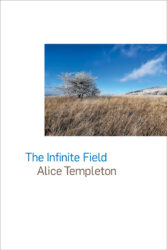Poetry Review: “The Infinite Field” — From the Personal to the Political
By Ross Taylor
The volume is an ambitious balancing act: the echoes of memory meet the grit of experience, musical language interlaced with occasional thick texture, nostalgic passion counterposed to philosophical calm.
The Infinite Field by Alice Templeton. Sixteen Rivers Press, 112 pages, $20.70.
 I’ve done enough work on actual farms to know that getting a scattered group of grazing cows to move across a big field can make it seem infinite. Alice Templeton’s book of poems has its share of homespun irony, but it also supplies plenty of romantic/modern awe. Even when staring down time and entropy, she covers a lot of ground. Her diverse poems look at the known universe through a number of different styles and perspectives.
I’ve done enough work on actual farms to know that getting a scattered group of grazing cows to move across a big field can make it seem infinite. Alice Templeton’s book of poems has its share of homespun irony, but it also supplies plenty of romantic/modern awe. Even when staring down time and entropy, she covers a lot of ground. Her diverse poems look at the known universe through a number of different styles and perspectives.
Much of the book’s movement is through time, from the present back to past memories, then a return to today. There are remembered scenes of town and country – real country – in Tennessee, and of present-day California. Templeton can conjure up so much pollen and sawdust it can almost make you sneeze, but she can also make abstraction beautiful or sad, in the manner of Clark Coolidge or Jorie Graham. In “Friday night in the garage” she carefully notes:
the radio was tuned to the county high football game
Rain pounded the tin roof then moved on dripping
in delicate percussion through the birdshot holes
Near the naked bulb a strip of flypaper hung from the rafter
amber tongue of preservation – almost science
but no one cared for the study. The clock was running out
On the other hand in “Remnants” she buzzes around the subject with the mystery of a sub-atomic particle:
A burning comes, dazzling, errant, fierce
gutting the house. It jangles the kinfolk, lurks
in the mortal nose, obliterates the pride of the quick
& the rich. Sheer therms undo the vainest wishes
of an extraordinarily you-ish zenith. The zippo
you extract with uneasy tenderness
strikes a rosy quotation. Pull off
the Nubian mantel! Lay kindling! Justice
harnesses the gift of fire, an eternal doubling,
the candle back atcha.
These are her extremes, but they are at the service of her version of Keats’ “negative capability.” Put in a more down-to-earth manner, her poems nurture the kind of diversity that supports a healthy ecosphere.
Her customary voice seems to have draw on the example of William Carlos Williams’ “variable foot” free verse, as well as some of his mixture of description and philosophizing.
As in “Magnetic North”:
I fix myself in time by jobs or songs
by the length of winters with or without
the chafe of love And gazing down from the bluff
I judge my foothold by the river’s crazy logic
Again, there are also a number of poems in the collection that follow strict forms. They aren’t anomalies. In “A Thin Snow,” for example, all ten stanzas have four lines, four beats per line and two lines repeated from the previous stanza. The poem grapples with an experience of enormous pain, after which, as Emily Dickenson insisted, “a formal feeling comes.” “The Prayer of the Farm Child” draws on the spare melody of a blues.
Templeton’s different approaches deal picking up and moving from one location to radically different one. But her poems also deal with a domestic collective, people who are participating in the same or similar challenging events. (The pronoun “we” recurs often.) Fire and injuries come along. As do flowers and picnic foods. Memphis and surrounding areas in Mississippi almost become characters. The book is dedicated “for my brothers,” but other friends and family members are also present. The very distance some of the poems fight to maintain highlight the intimacy of their emotional connections.
There are two poems, “World” and “World Burning,” that reference the image of a girl alone in a field, no doubt inspired by the image in Andrew Wyeth’s painting “Christina’s World.” Both poems center on memories the girl has left behind. “World” begins:
The house
of many shadows
is sternly ordered now
the barn
a shape without splinters
against the sky
My father’s shirts on the line
are no bigger
than the pigeons I’ve watched
from my chair
Much of The Infinite Field is about domestic relations and their impact on the inner world. Templeton also widens her view to address America. Shorter, intense poems like “Shipping Out, Then and Now” or “Who’s Lorraine?” deal with the larger, political world. “Shipping Out” interweaves images of her father in combat during WWII with a study of him in old age, once again facing death. “Who’s Lorraine?”is subtitled ‘Memphis, 1968.’ The location is the Lorraine Motel, where Martin Luther King was assassinated. It starts:
The first time I had a country
was the night the city burned
The Infinite Field is an ambitious balancing act: the echoes of memory meet the grit of experience, musical language interlaced with occasional thick texture, nostalgic passion counterposed to philosophical calm. Templeton looks deeply into personal matters, but also engages with what is going on, which is often traumatic, in the wider world.
Ross Taylor is a librarian in the Virginia suburbs of Washington, DC. His poems and stories have appeared in Greensboro Review, Antioch Review, Gargoyle,Texas Review, Poetry, and elsewhere.
